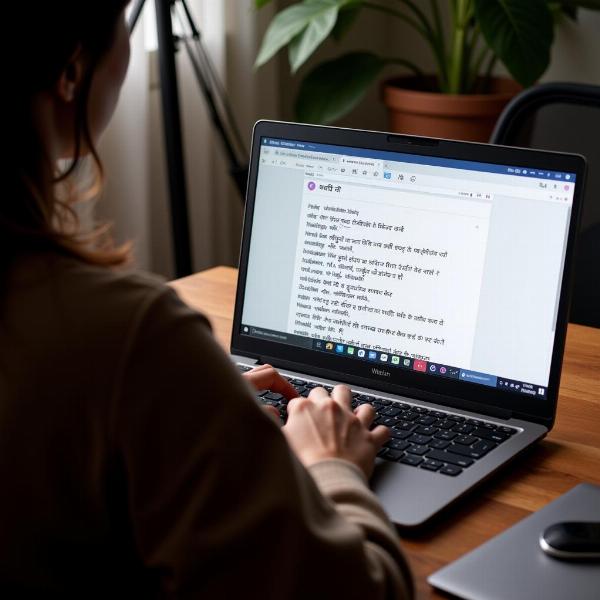Understanding the nuances of Hindi, especially when it comes to expressing past actions, can be tricky. “I wrote” is a simple phrase in English, but its Hindi equivalent can vary depending on the context and the specific tense you want to convey. This article explores the various ways to say “i wrote meaning in hindi,” delving into the grammar and providing practical examples to help you confidently communicate in Hindi.
Different Ways to Say “I Wrote” in Hindi
Hindi uses different verb conjugations to express the past tense. Here are the most common ways to say “I wrote”:
- मैंने लिखा (Mainne likha): This is the most common and straightforward translation of “I wrote.” It uses the perfective aspect, indicating a completed action in the past. For example, “मैंने एक पत्र लिखा (Mainne ek patr likha)” means “I wrote a letter.”
- मैं लिखता था (Main likhta tha): This translates to “I used to write” or “I would write.” It implies a habitual action in the past that is no longer performed. For instance, “मैं रोज़ डायरी लिखता था (Main roz diary likhta tha)” means “I used to write a diary every day.”
- मैं लिख रहा था (Main likh raha tha): This signifies “I was writing.” It describes an action that was in progress at a particular point in the past. “जब बारिश हुई, मैं पत्र लिख रहा था (Jab barish hui, main patr likh raha tha)” means “When it rained, I was writing a letter.”
Understanding the Nuances of Hindi Verb Conjugations
Hindi verbs change depending on the gender, number, and person of the subject. While “likha” (written) is the past participle used with “mainne” (I), it will change if the subject is different. For example, if the subject is “woh” (he/she/it), the verb would become “likha” (masculine singular) or “likhi” (feminine singular).
Common Mistakes to Avoid
One common mistake learners make is using the incorrect gender agreement with the past participle. Another is confusing the perfective and imperfective aspects, leading to inaccurate descriptions of past events.
Practical Examples and Applications
Let’s look at some practical examples to solidify your understanding:
- Formal Letter: “मैंने आपको यह पत्र सूचित करने के लिए लिखा है… (Mainne aapko yeh patr suchit karne ke liye likha hai…)” – I wrote this letter to inform you…
- Informal Conversation: “कल मैंने अपनी माँ को एक ईमेल लिखा (Kal mainne apni maa ko ek email likha)” – I wrote an email to my mother yesterday.
 Sending an Email in Hindi
Sending an Email in Hindi
Which Tense Should You Use?
Choosing the correct tense depends on what you want to express. If you are simply stating that you completed the act of writing, “mainne likha” is sufficient. However, if you are describing a habitual past action or an action in progress, you would need to use the appropriate imperfective forms.
Why is Understanding “I Wrote” Important?
Mastering the various ways to express “I wrote” is crucial for effective communication in Hindi. It allows you to accurately describe past events and participate in more complex conversations.
Conclusion
“I wrote meaning in hindi” encompasses a variety of expressions depending on the context and desired nuance. By understanding the different verb conjugations and tenses, you can communicate clearly and accurately in Hindi. Practice using these forms in different scenarios to improve your fluency and avoid common mistakes. Remember, the key is to choose the verb form that best reflects the specific past action you want to describe.
FAQ
- What is the most common way to say “I wrote” in Hindi? The most common way is “मैंने लिखा (Mainne likha).”
- How do I say “I was writing” in Hindi? You can say “मैं लिख रहा था (Main likh raha tha).”
- Does the verb change based on the gender of the subject? Yes, the past participle agrees with the gender and number of the subject.
- How can I practice using these verb forms? Try incorporating them into your daily conversations and writing exercises.
- Where can I find more resources for learning Hindi? You can find numerous online resources, textbooks, and language learning apps.
- Is it important to understand the different tenses for “I wrote”? Yes, it is crucial for accurate communication and conveying the intended meaning.
- What are some common mistakes to avoid when using these verbs? Common mistakes include incorrect gender agreement and confusing the perfective and imperfective aspects.
Meaning-Hindi.in is your one-stop solution for all your Hindi translation needs. We offer a wide range of professional translation services, including business and commercial document translation, certified and legal document translation, technical and user manual translation, website and localization services, educational and academic document translation, express translation, and specialized translations. Need accurate and culturally sensitive Hindi translations? Contact us today at [email protected] or call us at +91 11-4502-7584. Meaning-Hindi.in is committed to delivering high-quality translations that bridge language barriers and connect cultures.